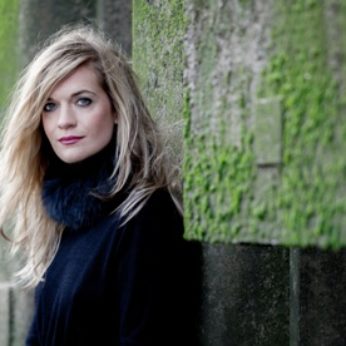Composer: George Crumb (b. 1929)
Performance date: 04/07/2012
Venue: St. Brendan’s Church
Composition Year: 1979
Duration: 00:25:02
Recording Engineer: Anton Timoney, RTÉ lyric fm
Instrumentation: S-solo, pf
Instrumentation Category:Duo
Artists:
Julius Drake -
[piano]
Ruby Hughes -
[mezzo-soprano]

Elegiac
Songs and Vocalises for Soprano and Amplified Piano on texts from Walt
Whitman’s When Lilacs Last in the
Dooryard Bloom’d [1979]
To a chamber music audience George Crumb is best known
for his electric string quartet Black
Angels – Thirteen images from the dark land, conceived as a kind of parable
of our troubled times in the aftermath of the Vietnam war and performed with
multiple special effects. Apparition
is a very different work though not without its unusual sounds as the piano is
prepared in such a way that plucking, strumming and drumming of the strings by
hand is readily audible to the audience. The soprano also gets involved in the
theatrics, imitating birdsong and forest murmurs, whispering and humming and
singing into the piano for added resonance.
The text is taken from Walt Whitman’s great poem When Lilacs Last in the Dooryard Bloom’d, written
in the weeks following the assassination of President Lincoln in 1865. However
Crumb chooses most of his text from a section sub-titled Death Carol, which moves away from the direct references to
moving meditation on death, in particular his idea of the circularity of life
and death. The literary and musical
materials focus on concise, highly contrasting metaphors for existence and
death…but death is never depicted as an ending of life. Instead it is circular,
always a beginning or an enriched return to a universal life-force.
A zither-like plucked piano opens the cycle with
hypnotic sounds evoking Nature. The text is highly symbolic, speaking of
eternity, time, consciousness and the
intimate cycle of life and death. The first vocalise echoes birdsong in summer.
When lilacs last in the dooryard bloom’d sadly
recalls
assassination. Dark mother is a
reverential chant to the constant presence of Death – always gliding near with soft feet.
Invocation is
harsh and primal with savage blows from the piano and a terrifying vocalise
from the singer, leading directly to the driving march of Approach strong deliveress joyously singing the dead, Whitman’s vision of death as feminine
and life-resurrecting. The third vocalise is the Death Carol sung by the hermit
thrush. Come lovely and soothing Death is
the most substantial song of the cycle, the mesmerising soprano line rising and
falling. Crumb closes by reaffirming Whitman’s circularity of life and death by
reprising the opening Night in silence.
Copyright © 2024 West Cork Music. All rights reserved.
Designed and developed by Matrix Internet